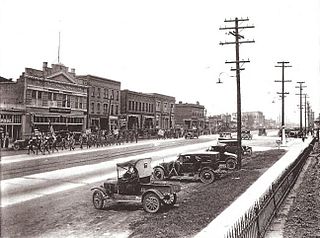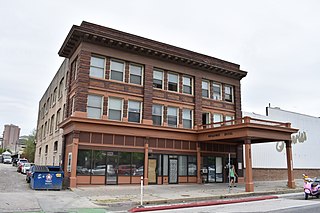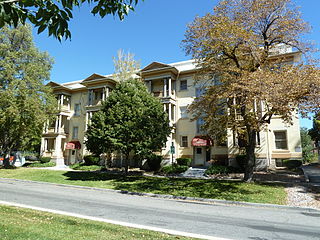
The Salt Lake City Council Hall is currently home to offices of the Utah Office of Tourism and the Utah Film Commission and is located on Capitol Hill in Salt Lake City, Utah. Built in 1864–66, the building is historically important as the Old Salt Lake City Hall or just Old City Hall from 1866 to 1894. It was designated a National Historic Landmark in 1975, as an emblem of the conflicts between the governments of the Utah Territory and the United States in the 19th century.
Hillview or Hill View may refer to:

St. Mark's Episcopal Cathedral located at 231 E. 100 South in Salt Lake City, Utah is the cathedral church of the Diocese of Utah in the Episcopal Church in the United States of America. Built in 1871, it is the third oldest Episcopal cathedral in the United States and the second oldest continuously used worship building in Utah. It was designed by architect, Richard Upjohn, in the Gothic Revival style. On September 22, 1970, it was added to the National Register of Historic Places.

The Murray Downtown Historic District is located in the historic city center of Murray, Salt Lake County, Utah. It was listed on the National Register of Historic Places in 2006, with a boundary increase in 2020.

The Harvey H. Cluff house is a house in central Provo, Utah, United States, built in 1877 that is on the National Register of Historic Places. It was originally owned by Harvey H. Cluff.

Silver Row is a historic site located in Provo, Utah. It is listed on the National Register of Historic Places.

Converse Hall is one of the oldest and central buildings on the campus of Westminster University in Salt Lake City, Utah, United States. It was listed on the National Register of Historic Places in 1978.

The Altadena Apartments in Salt Lake City, Utah, which includes the Altadena Flats and the Sampson Altadena Condominiums, were built in 1905 or 1906 by the Octavius Sampson family at cost of $21,000. The building has Tuscan columns, pediments, and dentillated cornices.

The Armista Apartments, known also as the Waldorf Apartments, at 555 East 100 South in Salt Lake City, Utah, United States were built in 1927. They were listed on the National Register of Historic Places in 1989.

The Chapman Branch Library in Salt Lake City, Utah, United States, is a Carnegie library that was funded by a $25,000 Carnegie Foundation grant and was built in 1918. It was listed on the National Register of Historic Places in 1980.

The Continental Bank Building is a historic 13-story commercial building in downtown Salt Lake City, Utah, United States, that is listed on the National Register of Historic Places (NRHP).

The Broadway Hotel is a historic hotel in Salt Lake City, Utah, United States.

Ashby Apartments, also known as Gooch Apartments and Suzanne Apartments, is a historic building in Salt Lake City, Utah. It was built in 1925-1926 for the Bowers Investment Company, and designed in the Mission Revival style. It was acquired by the Eflow Investment Company in 1926. From 1936 to 1963, it belonged to Ralph A. Badger, who owned and managed five apartment buildings in Salt Lake City, and who served as the president of the Apartment House Association of Utah. The building has been listed on the National Register of Historic Places since November 16, 2006.

Bigelow Apartments is a historic three-story building in Salt Lake City, Utah. It was built in 1930-1931 by Archelaus Fillingame, and designed in the Exotic Revival style. Fillingame was the developer, architect, builder and owner of the building, which remained in the Fillingame family until 1948. It has been listed on the National Register of Historic Places since December 30, 2004.

Corona Apartments is a historic three-story building in Salt Lake City, Utah. It was built by the Bowers Building Company in 1925, and designed in the Prairie School style. It has been listed on the National Register of Historic Places since October 20, 1989.

Ivanhoe Apartments is a historic three-story building in Salt Lake City, Utah. It was built as a U-shaped residential building in 1908 for Finch, Rogers and Mulvey, an investment firm co-founded by Harry L. Finch, Richard E. Rogers and Martin E. Mulvey. Their company later became known as the Ivanhoe Investment Company. The building was purchased by Jedd L. and Mary E. Jensen in 1943. It was designed in the Colonial Revival and Classical Revival styles. It has been listed on the National Register of Historic Places since October 20, 1989.

Lincoln Arms Apartments is a historic three-story building in Salt Lake City, Utah. It was built in 1924–1925 by Phillip T. Bratt, who owned the building with his wife N. Myrtle Bratt until 1926, when they sold it to Katie R. Stevens. It was later owned by J.B. Arnovitz and James L. White (1931–32), followed by J.H. and Elizabeth Angel. It has been listed on the National Register of Historic Places since October 20, 1989.

Cornell Apartments is a historic three-story building in Salt Lake City, Utah. It was built in 1910 by W.C.A. Vissing, an immigrant from Denmark who became "one of the most active developers of apartment buildings in Salt Lake City during the pre-World War I period". It was designed in the Colonial Revival and Classical Revival styles. Vissing sold the building to Blanche Castleman in 1912, and it belonged to the Bergerman family from 1923 to 1934. It has been listed on the National Register of Historic Places since October 20, 1989.

Smith Apartments is a historic three-story building in Salt Lake City, Utah. It was built as a U-shaped residential building by Andrew and James E. McDonald in 1908, and designed in the Prairie School style by architects Walter E. Ware and Alberto O. Treganza. It belonged to David Smith, a rancher from Idaho, until 1944, when it was acquired by the Riverton Motor Company. It has been listed on the National Register of Historic Places since October 20, 1989.

The Benworth-Chapman Apartments and Chapman Cottages are two apartment buildings in Salt Lake City, Utah. The Benworth-Chapman Apartments building was built as Benworth Apartments by George Bowles & Sons in 1927, and designed in the Mission Revival style. Bowles sold the building to Benjamin L. Farnsworth in 1927, and Farnsworth, his wife Alice and some of their children lived in the building with their tenants. The building belonged to the Zions Bank from 1933 to 1937, when it was acquired by Clarissa G. Chapman, who renamed it Chapman Apartments. Chapman Cottages was built in 1937–1940. It has been listed on the National Register of Historic Places since December 30, 2004.























